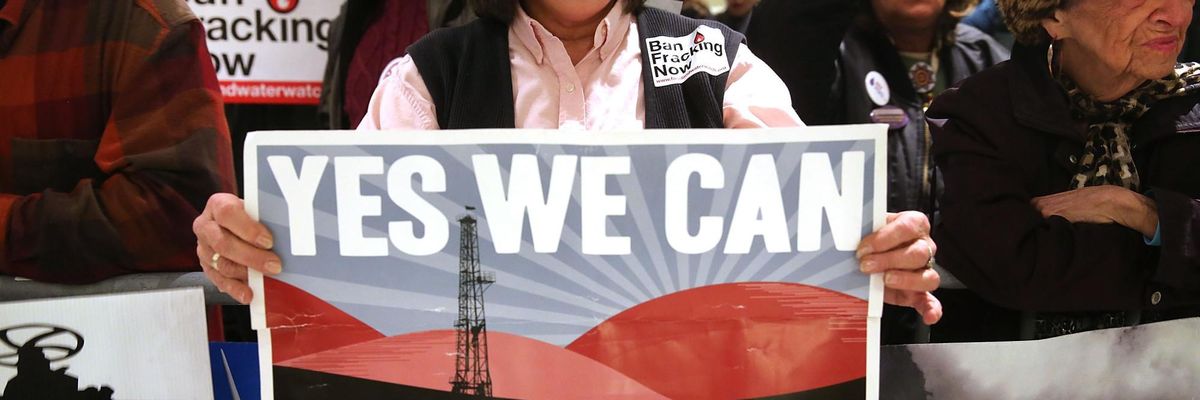If it wasn't about the future of the planet, I'd laugh at the chutzpah. One day after Earth Day, the GOP-led House Committee on Science, Space, and Technology, chaired by Texas Congressman Lamar Smith (recipient of more than $600,000 from the oil and gas industry) held a hearing about efforts to ban fracking. Obviously, Big Oil and Gas is mighty worried about the success of the powerful grassroots movement to ban fracking.
Where to even begin? Let's start with the headline speakers. Not even one person was invited to represent the affected communities from around the country, nor was one of the hundreds of members of Americans Against Fracking invited to discuss why a ban on fracking is crucial.
Instead, the GOP invited the Environmental Defense Fund, a group that has decried efforts to ban fracking, claiming that if "best practices" are used, it can be done safely. EDF is a "strategic partner" of the pro-fracking Center for Sustainable Shale Development alongside corporate giants Chevron and Shell. In his testimony, EDF's representative repeated many industry talking points.
Starting to get the picture? Wait, there's more. In the height of irony, a representative from Energy In Depth, an industry-funded front group, was on hand to release a new white paper decrying how the environmental groups get foundation money (and, as far as I can tell, the EDF representative never refuted their outrageous claims.) Meanwhile, while conducting research for my upcoming book Frackopoly, we discovered through SEC filings that the top 10 oil and gas companies had almost $80 billion in profits in 2014; and it was ExxonMobil, the largest fracker today, that spent millions funding climate deniers. Energy In Depth was created by the Independent Petroleum Association of America "to combat new environmental regulations." Early funders included some of the largest oil and gas companies on earth, including BP, Chevron, and Shell.
No, it isn't public interest foundations that are paying Energy In Depth's salaries--it's money from climate denying companies that are devastating the environment. No wonder they're alarmed that New York State listened to the increasing body of science that shows fracking is bad news; this hearing is the latest proof that industry is working in overdrive to discredit the work of scientists that believe fracking is dangerous to public health, our environment and communities.
We're not surprised the scientist present on today's panel raised no such alarms. Dr. Donald Siegel, a scientist at Syracuse University, was recently accused of failing to disclose fees he received from Chesapeake Energy in a study on methane contamination of drinking water wells from fracking. His study concluded that proximity to a fracked well was not necessarily linked to methane concentrations in groundwater. The study was also criticized for its methane testing methods, and put under ethics review.
Industry groups, including Energy In Depth, predictably cheered the findings. In his testimony today, Dr. Siegel criticized a methane study that conflicts with his study's conclusions by suggesting that it used skewed samples.
Christi Craddick, the Chair of the Railroad Commission of Texas, the oil and gas regulator that is a toady for the industry, was another panel member. When the city of Denton, Texas, passed a ban on fracking in November of 2014, Craddick announced that she would ignore the ban and continue to issue fracking permits.
Today's event wasn't a serious exercise in democracy. It was a circus. Congress can do better. In fact, members of Congress have an excellent opportunity right now to listen to the growing chorus of advocates who are demanding that our leaders put people and the planet over oil and gas industry profits: new legislation in the House was announced yesterday to ban fracking on public lands--the strongest federal legislation against fracking to-date.
This very orchestrated hearing shows that a growing movement is getting behind the ever-deepening body of science showing that we need to ban fracking--and it's making the industry very nervous.

